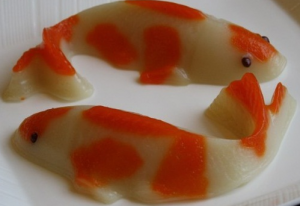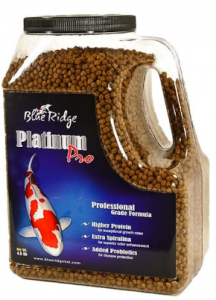As you look at the list of ingredients on the back of your koi food, you might find yourself wondering what some of them are—especially some of the ones that you can’t pronounce.
The “best” type of koi food is a hotly debated topic, and most koi enthusiasts are particularly loyal to their brand of food. Koi food selection in many instances is based on recommendations of other koi keepers who have had success with a particular brand, and then there are sone intrepid koi keepers who devise their own DIY koi food recipes.
One veteran hobbyist claims that koi food choice boils down to this:
The better foods are the ones which leaves the least waste in the bio-filter.
She goes on to elaborate:
What I have noticed is that there are foods which leave little waste at the top of the filter, which tells me that their bodies are pulling in the best nutrients from the food, which leaves little waste in the filter.
The specially formulated foods are carefully crafted to address a lot of the different dietary needs of koi that also account for factors like water temperature, growth, ill health and coloration.
In all food types, there will be some staples that are consistent: Protein, Fat, Fiber. These staples will be provided in different percentages from food type to food type—even within the same brand manufacturer—as they are used for different purposes.
Interesting fact
Although it is commonly agreed upon that anything more than 40% protein in koi feed is unnecessary (and can lead to extra waste in the pond), some experts conclude that a koi’s protein intake will get as much as 60-65% in its natural environment as a result of algae ingestion.
Protein aids in growth and reproductive functions, fat is the energy provider and fiber serves to help with digestion. Along with this, the vitamin and mineral additions will help with sundry metabolism regulation, and overall koi health and vitality.
Here’s a look at some of the ingredients that you might find in your koi food and what purpose it serves:
L-Ascorbyl-2-Phosphate—Also known as ascorbic acid, it is good ol’ Vitamin C. This is how your koi boost their immune system.
DL-alpha tocopheryl acetate—This is a synthetic form of vitamin E. The alpha tocopheryl is the most biologically active form of vitamin E as it is the liver’s preferred form of vitamin E transportation. Vitamin E is an immune system booster and also helps to develop the nervous system while maintaining strong and healthy tissues.
Thiamine Mononitrate—Derived from Thiamine (a form of vitamin B1), this a salt form and is used in fortifying koi food to help with food metabolization.
Riboflavin—Another B vitamin (B2) making up the 8 B vitamins that are collectively known as the B-complex. This is a water soluble vitamin that helps to break down the composite parts of food into useable energy.
Nicotinic acid—Also known as niacin or more commonly Vitamin B-3. This is one of the necessary precursors to coenzymes that help to breakdown complex molecules into smaller ones.
Choline Chloride—This B vitamin (B4) is an additive in many pet foods that is essentially a helper molecule (or in this case a methyl donor) that aids in metabolic processes and in breaking down fats. It also helps to boost nervous system function.
D-Calcium Pantothenate—Also known as Vitamin B5, it is another component of coenzyme A (CoA) which helps to chemically break down food components (fats, proteins and carbohydrates) into energy.
Pyridoxine hydrochloride (HCL)—This is vitamin B6. It is a coenzyme whose function it is to help in turning what your koi eats (proteins, fats and carbs) into fuel as well as helping with nerve function and red blood cell production.
Biotin—AKA Vitamin B7 (formerly known as Vitamin H and coenzyme R), it is part of the B vitamin group that breaks down food into energy. It also aids the metabolic function as well as helping to keep the eyes, liver, nervous system and skin healthy.

Folic acid—This also goes by the handle Vitamin M as well as Vitamin B9. It is a synthetic form of folate (which is found naturally in foods like leafy greens, nuts and beans). It is used to help synthesize and repair DNA which is important for growth and health.
Cyanocobalamin—The synthetic form of B12. It is integral in the maintenance of healthy metabolism, nerves and blood cells.
Spirulina—It is a form of algae with a high protein index. The carotenoids in it act as a color booster for your koi. It works best if your koi is exposed to sunlight.
Cholecalciferol—Vitamin D3. It helps with enzyme synthesis, calcium absorption and overall calcium maintenance for healthier bones and skin.
Inositol—A pseudo-vitamin (“vitamin-like”) that exists in numerous foodstuffs, but is used a dietary supplement. It functions to help oxidize fats in the blood stream for energy, and with the transmission of nerve impulses.
DL-methionine—This is the supplement form of methionine which is described as one of the 10 essential amino acids (building blocks for proteins) that are important in numerous cellular functions. It is responsible for the health of various bodily functions including the liver, heart and skin (with regards to quicker wound healing).
Menadione dimethylpyrimidinol bisulfite—The supplemental form of Vitamin K, it is added to koi food to help with the clotting function as well as bone formation. You might also see it listed as menadione sodium bisulfite complex.
Zinc oxide—This is an inorganic compound that, when used in foods, is used for fortification value (that is to boost the nutritional value of the food it is put into). It is believed to help with free radical protection, tissue regeneration, immune function as well as nutrient absorption.
Zinc sulfate—Another form of the same zinc inorganic compound that is a co-factor in many enzymes responsible for overall cellular function and repair.
Manganous oxide—Manganese is a trace element that when oxidized is a safe food additive. It is used to help bone growth, metabolic and cell membrane strength.
Ferrous carbonate—This is another dietary supplement used to fortify foods with iron. It helps in raising the amount of iron in your koi to combat iron deficiency and promoting Oxygen-rich blood.
Copper sulfate—Copper is in numerous enzymes that are used to produce blood cells and connective tissue. It also helps with iron metabolization and the correct functioning of the nervous system.
Calcium iodate—The most stable inorganic compound for iodine delivery. Iodine is important in creating strong and healthy bones as well as overall cardiovascular health.
Calcium carbonate—This is used as a means to supplement calcium in the diet. Along with calcium iodate it promotes healthy bones and can buffer any acidic foods eaten (like an antacid).
Cobalt carbonate—An inorganic metal dietary supplement that is used to boost vitamin B12 synthesis, a coenzyme that is important for a healthy metabolism, nerves and blood cells.
Canthaxanthin—This is a food colorant giving food a pink or orange appearance.
Ash—This is the leftovers once all the waste and leftovers are burned. The percentage of this is not often reported.
Storage fact
Keep your koi food out of direct sunlight in a cool, dry place in an airtight container. Koi food will naturally lose its nutritional strength over time, but sun and heat speed the process up. Excess moisture will turn your pellets into a sticky, clumpy mess.
 As well as providing top quality koi, butterfly koi and goldfish sourced from some of the industry’s best suppliers for over 10 years, Next Day Koi has its own brand of quality koi fish food available, too.
As well as providing top quality koi, butterfly koi and goldfish sourced from some of the industry’s best suppliers for over 10 years, Next Day Koi has its own brand of quality koi fish food available, too.
Offered in different weights, our customers can choose from:
Blue Ridge Cool Water Wheat Formula Koi Food
Blue Ridge Growth Formula Koi Food

